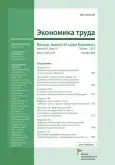Digital literacy as an element of developing the professional potential of the elderly population
- Authors: Kucherenko K.S.1
-
Affiliations:
- Plekhanov Russian University of Economics
- Issue: Vol 10, No 10 (2023)
- Pages: 1569-1584
- Section: Articles
- URL: https://journals.eco-vector.com/2410-1613/article/view/625114
- DOI: https://doi.org/10.18334/et.10.10.119276
- ID: 625114
Cite item
Abstract
Increasing life expectancy and declining birth rates are leading to demographic aging of the population and a corresponding increase in the number of older employees. It is particularly important to develop the professional potential of the population in this age group. In conditions of accelerating technological progress, digitalization of the economy, automation of routine operations in production, the emergence of language generative models, and the spread of remote forms of employment, it is the development of digital competencies as an integral element of the professional potential of older employees that is becoming a key problem of the main economic agents in the labor market. This article presents the results of a statistical assessment of the level of digital competencies of the older population and the level of age-related technophobia. Separate aspects of digitalization in the workplace (remote employment) and digital competencies (the need for knowledge in the field of IT) are analyzed. It is revealed that the Russian Federation has a high level of digital technology proficiency. This level has age-specific characteristics. The younger population is optimistic about ICT, while the older generation is moderate in their assessments and rather does not experience the impact of new technology on their lives. There are still limited opportunities for remote employment in the workplace, and with age, employees feel less need to improve their own digital literacy, which may be related to their employment structure (employment in non-technological industries).
About the authors
Kirill Sergeevich Kucherenko
Plekhanov Russian University of Economics
Email: kskucherenko1@gmail.com
References
- Выборочное федеральное статистическое наблюдение по вопросам использования населением информационных технологий и информационно-телекоммуникационных сетей. Федеральная служба государственное статистики. [Электронный ресурс]. URL: https://rosstat.gov.ru/free_doc/new_site/business/it/ikt21/index.html (дата обращения: 19.09.2023).
- Итоги комплексного наблюдения условий жизни населения в 2022 году. Федеральная служба государственной статистики. [Электронный ресурс]. URL: https://rosstat.gov.ru/free_doc/new_site/GKS_KOUZH_2022/index.html (дата обращения: 19.09.2023).
- Дмитриева Н.Е., Жулин А.Б., Артамонов Р.Е., Титов Э.А. Оценка цифровой готовности населения России. - М.: Изд. дом Высшей школы экономики, 2021.
- Смирных Л. И. Цифровая грамотность пожилого населения и цифровизация предприятий: опыт европейских стран // Вопросы экономики. – 2020. – № 12. – c. 104-124.
- Абдрахманова Г. И., Бондаренко Н. В., Вишневский К. О., Гохберг, Л. М., Демьянова А. В., Кевеш М. А., Ковалева Г. Г. Тенденции развития интернета в условиях формирования цифровой экономики. - М.: НИУ ВШЭ, 2018.
- Arthanat S. Promoting Information Communication Technology Adoption and Acceptance for Aging-in-Place: A Randomized Controlled Trial // Journal of Applied Gerontology. – 2019. – № 40 (5).
- Bogataj D., Campuzano Bolarin F., Kavšek M., Rogelj V. Smart Silver Villages as part of Social Infrastructure for Older Adults in Rural Areas // IFAC-PapersOnLine. – 2020. – № 53 (2).
- Choi N.G., DiNitto D.M. Internet use among older adults: Association with health needs, psychological capital, and social capital // Journal of Medical Internet Research. – 2013. – № 15(5).
- Davis F. Perceived Usefulness, Perceived Ease of Use, and User Acceptance of Information Technology // MIS Quarterly. – 1989. – № 13(3).
- Di Giacomo D., Ranieri J., D’Amico M., Guerra F., Passafiume D. Psychological Barriers to Digital Living in Older Adults: Computer Anxiety as Predictive Mechanism for Technophobia // Behavioral Science. – 2019. – № 9(9).
- Formosa M. Digital exclusion in later life: A maltese case study // Humanities and Social Science. – 2013. – № 1(1).
- Aging in the Digital Age: Conceptualizing Technology Adoption and Digital Inequalities Hargittai E., Piper A.M., Morris M.R. Aging in the Digital Age: Conceptualizing Technology Adoption and Digital Inequalities // Neves B.B., Vetere F. Ageing and Digital Technology. Singapore: Springer, 2019
- Leukel J., Schehl B., Sugumaran V. Digital inequality among older adults: explaining differences in the breadth of Internet use // Information, Communication Society. – 2023. – № 26.
- Lissitsa S., Zychlinski E., Kagan M. The Silent Generation vs Baby Boomers: Socio-demographic and psychological predictors of the “gray” digital inequalities // Computers in Human Behavior. – 2022. – № 128.
- Marler W., Hargittai E. Division of digital labor: Partner support for technology use among older adults // New Media Society. – 2022.
- Reisdorf B.C., Groselj D. Internet (non-) use types and motivational access: Implications for digital inequalities research // New Media Society. – 2017. – № 19 (8).
- Reneland-Forsman L. «Borrowed access» – the struggle of older persons for digital participation // International Journal of Lifelong Education. – 2018. – № 37.
- Seifert A, Cotten S., Xie B. A Double Burden of Exclusion? Digital and Social Exclusion of Older Adults in Times of COVID-19 // The Journals of Gerontology: Series B. – 2021. – № 76 (3).
- Seifert A. The Digital Exclusion of Older Adults during the COVID-19 Pandemic // Journal of Gerontological Social Work. – 2020. – № 63(6-7).
Supplementary files








